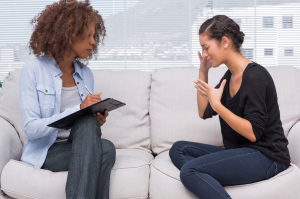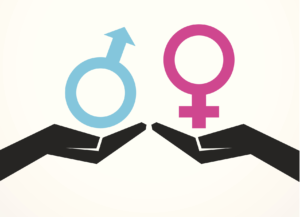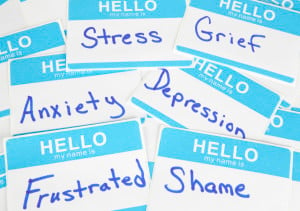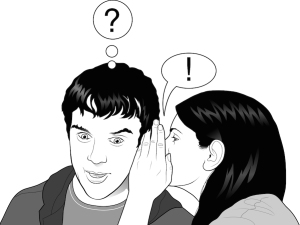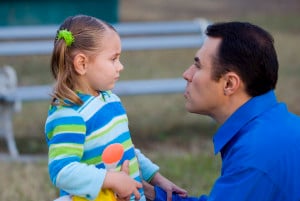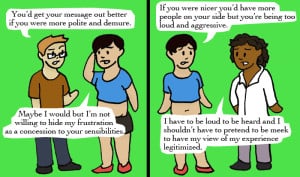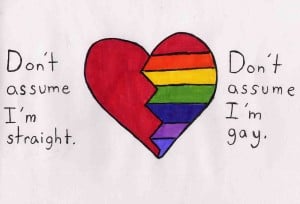Throughout middle and high school, I felt like my friends and peers were privy to something I wasn’t.
They started to have crushes on each other, date each other, and as we got older, have sex.
I still hadn’t even had a crush.
I just couldn’t wrap my mind around why they were so intent on sex and dating when there were so many other more interesting things to focus on.
Feeling different from my peers bothered me, and I wondered what was “wrong” with me.
Even though I was happy with who I was, it made socializing difficult when so much of my friends’ lives were about exploring something I couldn’t understand.
Then something life-changing happened: One of my friends introduced me to the concept of asexuality, and suddenly I realized that nothing was wrong with me at all!
I had an identity, and there were other people like me in the world. The way I felt and the trouble I was having relating to my peers quickly made sense.
I started researching asexuality, and I felt like I finally had a way to talk about the way I was feeling. I was eager to explore this part of my identity and what it might mean to be more in community with other asexual people.
The first person I told was my therapist. Big mistake.
She immediately responded by telling me that my asexuality would go away as I got older (I was 18 at the time). She also said that she thought that my lack of interest in sex was probably “just a symptom” of my depression.
I argued and told her I didn’t think it would go away. It was true that I’d been experiencing depression since long before puberty started, but it just didn’t feel like a symptom to me – it felt like an identity.
I never went back to that therapist, and it was years before I tried to get help dealing with my depression again.
After my therapist’s denial of what was rapidly becoming an important part of my identity and the way I understood myself, it was a long time before I told anyone about being asexual. And that impacted me, and my development, in several different ways:
I didn’t understand how to best navigating romantic relationships, consent, and safety.
I was more empowered because I had the vocabulary to describe myself, but a lot of people still didn’t understand what asexuality was. My romantic relationships suffered as a result.
One partner thought he could make me sexual, so he pressured sex when I didn’t want it, and I gave in because I grew up in a world where sex is considered an obligation in relationships.
It wasn’t until I felt validated and assured in my identity that I gained the ability to talk about my sexuality safely and openly, making my relationships healthier because I was able to communicate more honestly and (assuming a respectful partner) ensure my needs were respected.
If my therapist had actually supported me instead of denying my own self-wisdom and understanding, I might have gained those tools much earlier in life.
I waited too long to find access to Asexual community and explore that part of my identity.
My therapist’s attitude taught me to expect the worst from people, and while I still never felt wrong about being asexual, it made me question whether it would be safe for me to seek out a community.
It was nearly four years after my visit to that office that I finally became more active in the asexual community and started seeking out other people who understood my experiences.
Finding that community taught me that I am not alone, and that there is nothing wrong with me. It helped me reach a point where I could just be happy with who I am.
I felt depressed and broken for far too long.
Before discovering a way to talk about my sexuality, I had felt alienated and broken. I never wanted to change who I was or how I felt about sex, but I still felt depressed because of the trouble I was having connecting with and understanding my peers.
By denying the reality of my sexuality, my therapist brought back the feelings I had started recovering from and set my efforts to accept myself back.
My therapist had taught me that I couldn’t expect a positive or understanding reaction, and I took that lesson to heart. Consequently, I didn’t tell my boyfriend until I thought we had enough trust between us to be safe and I found myself leaving out information about my asexuality for the first several years.
It’s impossible to know whether that particular boyfriend would have been more understanding if I’d felt safe enough to talk to him sooner, but the expectations that we’d both been taught our whole lives about sex, sexuality, and their role in relationships led to confusion and conflict when I wanted to step back and be more honest with myself and with him about my reality.
My experiences with that boyfriend were largely a product of asexual erasure.
I found that when I finally did open up, I was suddenly responsible for fully educating him about asexuality because it had literally never occurred to him that a person could not be interested in having sex. His failure to understand meant that he posed a threat to me as he pressured me to prove my identity to him.
Asexual erasure can also more directly harm the mental health of asexual people themselves.
When the world doesn’t present an alternative to sexuality, asexual people often find themselves believing they are the problem, which is why it is so critically important for mental health professionals to affirm patients who bring up asexuality.
Why You Should Care If Sexual Minorities Aren’t Recognized in Mental Health Care
I do honestly believe that my therapist thought she was doing right by me. Asexual erasure is in many ways built into the American Psychological Association and the DSM.
Many professionals assume asexuality is the layperson’s term for hypoactive sexual desire disorder, and on the surface, they look very similar. But there is a very important difference.
People experiencing hypoactive sexuality disorder are suffering from significant distress, whereas people who are asexual may not be completely happy with their life experiences as a result of being asexual, but the lack of sexual attraction is not the problem itself.
While my therapist wasn’t trying to use this diagnosis specifically to explain away my sexuality, her response likely stemmed from the idea that a lack of interest in sex is a problem that needs a solution.
She wasn’t listening to how I felt about it, just trying to figure out a cause so that she could work on a solution. And it’s true that sometimes people who have depression experience a decreased interest in sex, but not everyone who isn’t interested in sex is depressed.
One of the most helpful things a therapist can do to avoid denying a client’s identity is to listen to how the client is talking about their experiences.
In my case, I was excited about finding a way to talk about my experiences, but still trying to work out what it meant and how people would respond if I “came out.”
Someone who might be experiencing hypoactive sexual desire disorder would likely be describing the situation very differently. They would probably be focusing on how to change their level of interest in sex, not trying to process an identity.
It’s also okay for a therapist to ask whether a client is having trouble with their lack of interest in sex because of internal factors (which would probably indicate hypoactive sexual desire disorder) or from external factors like social pressures (which is more likely an indicator of asexuality).
Ultimately, it’s important to let the client decide for themselves whether or not there is a problem that needs addressing and if so, what that problem is.
So what can asexual people do to protect themselves when seeking a mental healthcare professional?
1. Connect with Others Who Share Or Validate Your Identity
You may not connect often, but it can be helpful to know that you are not alone in your experiences and someone is there for you if you really need to talk.
There aren’t many in-person groups, but the Asexuality Visibility and Education Network (AVEN) has very active forums and resources available 24/7.
2. Know You Have a Right to Be Respected By Your Mental Health Professional
When you talk to a therapist, you should feel comfortable asserting why you made an appointment and what you are hoping to get out of the experience. Any good mental health professional will let you know if they don’t believe they are the right fit.
You can start looking for a therapist that will be more open to your identity by looking for a professional who frequently works with LGBTQIA+ people.
Sometimes your local LGBTQIA+ groups will have suggestions. But be aware that sometimes the LGBTQIA_ community is not inclusive of asexuality, and those attitudes may still find their way into your therapist’s office.
If your therapist isn’t working for you for any reason, it’s okay to look for another.
3. Familiarize Yourself with Asexuality
It’s a spectrum that includes several different types of asexuality, and finding the one that feels right to you can help you to better communicate with others, but more importantly to feel more comfortable with yourself.
People who don’t understand asexuality are much less inclined to deny your identity if you can let them know, clearly, that it is who you are and that you are comfortable with it.
***
My asexuality is not something I ever wanted to change about myself, but my therapist made it clear that it was wrong and it was a problem. It took me a long time to work through the damage caused by the idea that anything unusual about sexuality is pathology.
While I am so happy that I never accepted my therapist’s message that it was something I would need to work on changing about myself, that belief unfortunately gets internalized by too many people.
If you do think you might be asexual, I urge you to do what feels best for you—connect with other asexual people, seek out other opinions, and most importantly, work on accepting yourself and doing right by you.
[do_widget id=’text-101′]
Kirstin Kelley is graduate assistant at The WIP who is completing her master’s degree in Nonproliferation and Terrorism Studies at the Monterey Institute of International Studies.
Search our 3000+ articles!
Read our articles about:
Our online racial justice training
Used by hundreds of universities, non-profits, and businesses.
Click to learn more


